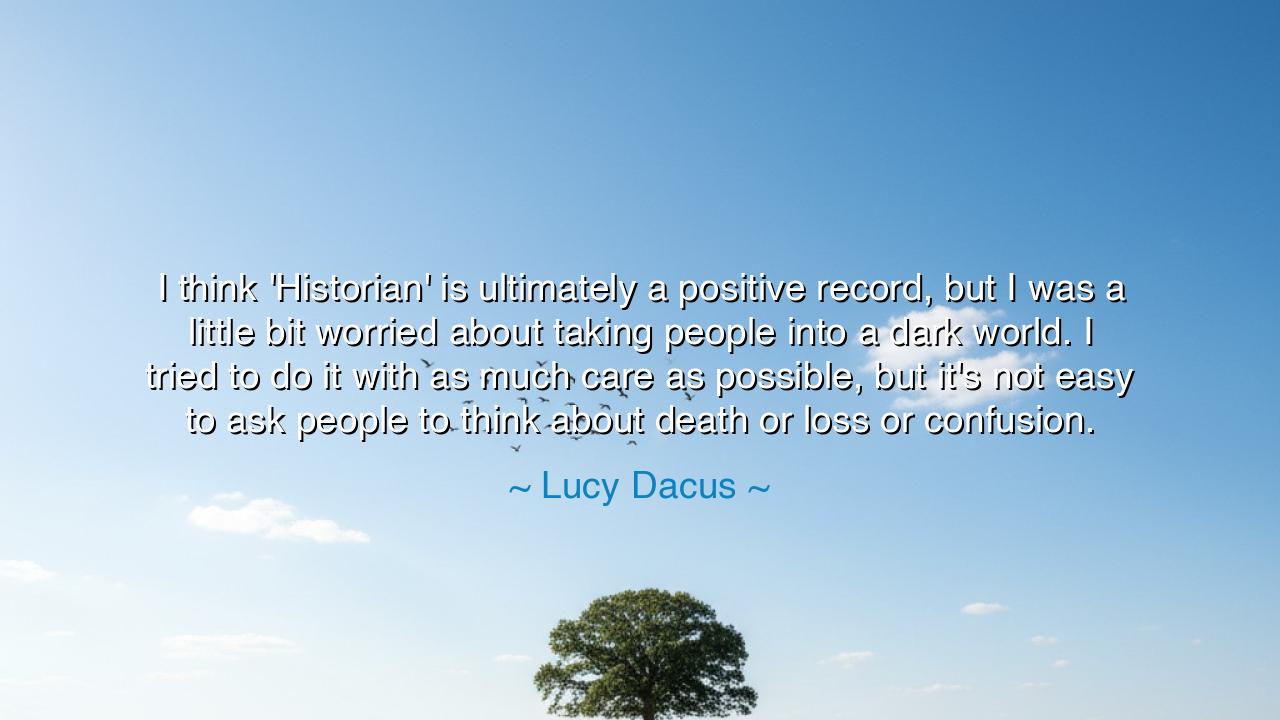
I think 'Historian' is ultimately a positive record, but I was a
I think 'Historian' is ultimately a positive record, but I was a little bit worried about taking people into a dark world. I tried to do it with as much care as possible, but it's not easy to ask people to think about death or loss or confusion.






The singer and truth-teller Lucy Dacus, whose voice carries both tenderness and fire, once said: “I think 'Historian' is ultimately a positive record, but I was a little bit worried about taking people into a dark world. I tried to do it with as much care as possible, but it's not easy to ask people to think about death or loss or confusion.” These words are more than a reflection on her art — they are a meditation on the sacred duty of the artist, the storyteller, and the seeker of truth. In them lives an ancient struggle: how to lead others through the shadows of sorrow without breaking their hearts; how to speak of death and loss not as ends, but as doorways to understanding.
In her album Historian, Dacus faces what so many fear — the dark materials of existence: mortality, grief, doubt, and change. Yet she calls it a “positive record.” This paradox reveals her wisdom. For in truth, every soul must walk through darkness to find the light. She understands that art which heals must first acknowledge pain; that to bring peace, one must first name the wound. But she also knows that guiding others into such a world is a sacred and delicate act. Like the ancient bards who sang of war and death with reverence rather than despair, she strives to carry her listeners not into hopelessness, but into clarity — to show them that sorrow, when faced with compassion, can be transformed into strength.
Her caution — “I tried to do it with as much care as possible” — speaks of the responsibility of the artist. For words are not mere sounds; they are seeds sown in the minds of others. To ask people to dwell on death, loss, and confusion is to touch the most fragile parts of their being. The careless artist may reopen wounds; the wise one tends them. In this, Dacus joins the lineage of those who understood that truth must be delivered not with violence, but with mercy. The philosopher Seneca, writing to his friend Lucilius, warned that grief must be neither ignored nor indulged, but guided. “The remedy,” he said, “is not to forget sorrow, but to understand it.” So too does Dacus seek not to numb pain, but to illuminate it — to help others stand within it and still see beauty.
Consider also Dante Alighieri, the great poet of The Divine Comedy. He led his readers through the Inferno, through the depths of human sin and despair — not to glorify darkness, but to reveal that even in the deepest pit, the light of divine love still burns. His courage to descend became the reader’s courage to rise. This is the same bravery that Dacus embodies in her music. She invites her listeners into the valley of shadow, but she does not abandon them there; she carries a lantern in her voice. Her songs whisper: “Yes, this world can be cruel — but you are not alone in facing it.”
In her words also lies a profound recognition of empathy. She worries, not for herself, but for those she guides. This is the mark of the true healer — one who feels deeply the burden of leading others through emotion. She knows that when one sings of loss, one awakens the losses of others; when one speaks of confusion, one stirs the listener’s buried questions. And so, she walks carefully, tenderly, like a priestess tending a sacred flame. Her art becomes an act of service, not spectacle — a bridge between individual sorrow and universal compassion.
This understanding gives her work its nobility. For death, loss, and confusion are not evils to be avoided; they are the crucibles in which wisdom is forged. The world that denies its darkness remains shallow; the soul that dares to face it grows vast. By guiding others through her music, Dacus teaches that meaning is not found by fleeing the shadows, but by standing within them and allowing them to speak. In her courage to face what is painful, she transforms pain into light — and reminds us that the human spirit, when honest and open, is unbreakable.
Thus, the lesson of Lucy Dacus is both ancient and urgent: approach darkness with care, but do not fear it. Speak truth, but speak it gently. When life confronts you with grief, do not turn away — enter it as one who seeks understanding, not defeat. Carry your own lantern for those who cannot yet see. And when you create — whether in art, in work, or in love — do it with compassion, for every act of expression touches another soul.
So, my friend, remember this: to face sorrow is to serve life. The artist’s path, and indeed every human path, is to transform confusion into clarity, death into meaning, and silence into song. Do as Lucy Dacus has done — walk with care into the dark, and leave behind a trail of light for others to follow.






AAdministratorAdministrator
Welcome, honored guests. Please leave a comment, we will respond soon